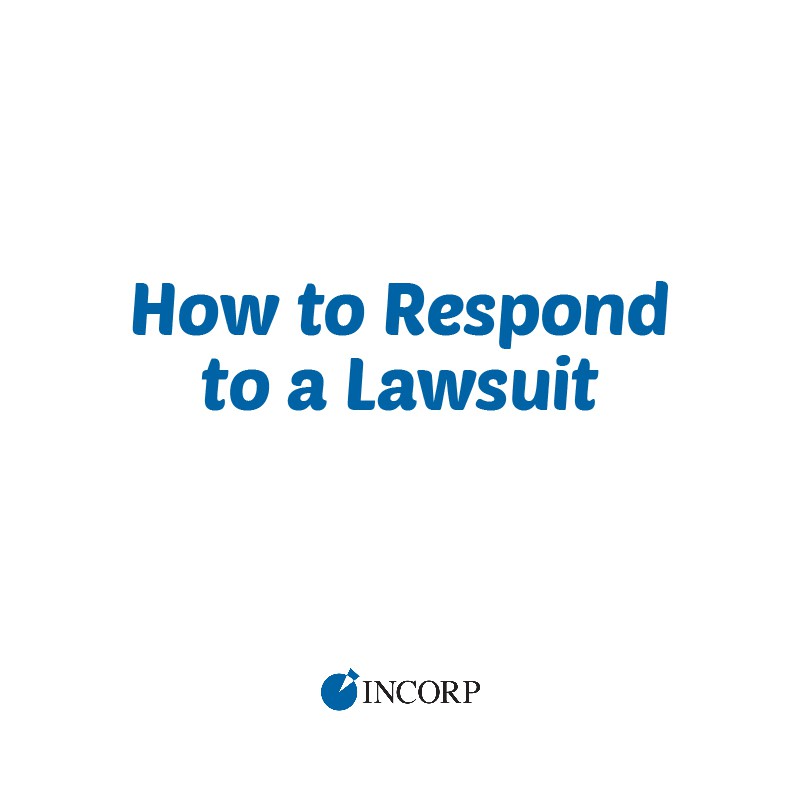Stay in the know!
Join our newsletter for special offers.
Contrary to popular belief, the most detrimental thing that can happen to your business isn't being sued; it's failing to respond to a lawsuit upon being served. Although receiving a summons can be quite stressful and invoke distressing thoughts of “what if,” we're here to help alleviate the fear of uncertainty by guiding you through the process of properly responding to a lawsuit the moment you are served.
Once you receive a complaint, it's important to remember that there is a deadline to respond. If you have an attorney, it is always recommended that you immediately notify that attorney, and he or she can walk you through your best options. That said, you typically have twenty to thirty calendar days from the date of receipt of a summons and complaint to file a response. However, this timeframe can vary, so it is important that you read the summons very carefully to avoid any potential complications. As your registered agent, InCorp strives to notify you within 24 hours of receipt of a summons to ensure you are adequately informed.
Once you have been served with a complaint, you have a few options to choose from for taking action. Below are a few options you can consider:
The most common way to respond to a complaint is by filing an answer. Filing an answer does not mean you admit fault; it simply provides you with the opportunity to respond to the plaintiff's allegations while simultaneously allowing you to tell your side of the story in an attempt to defeat plaintiff's claim. Filing an answer is a precautionary measure that is taken to keep the plaintiff from winning by a default judgment, and it notifies the court that you intend to defend the accusations that have been made against you.
Being served with a lawsuit does not automatically mean you need to appear in court. At any time during the response period, you can negotiate with the plaintiff and attempt to resolve the dispute. However, it is important that you keep track of your time period. Even if you are in negotiations, you'll still need to file an answer before the cessation of the deadline.
If the original complaint lacks important information and/or details about the claim, some jurisdictions allow you to file a motion for a more definite statement. You would typically file this type of motion if the plaintiff's complaint is too vague, which would prevent you from filing an answer. This motion requires the plaintiff to submit additional details pertaining to their claim. Similar to a motion to dismiss, a motion for a more definite statement delays your response deadline.
Another option you have once you've received a complaint is to file a cross-complaint in conjunction with your answer. Filing a cross-complaint means that you are suing the plaintiff for damages derived from the same events of the original lawsuit. Once submitted, the plaintiff in the original lawsuit is now considered a cross-defendant in your cross-complaint.
A motion to dismiss is a request for a court to dismiss a case. Common reasons for dismissal include lack of jurisdiction, failure to state a claim, or a successful negotiation with the plaintiff. By filing a motion to dismiss, the time for you to file an answer to the complaint is postponed until the judge makes a decision on your motion. If the judge grants your motion, the case is dismissed and over. If the judge denies your motion, you are now obligated to file an answer within a specified time period as determined by the judge (typically 10 days). If you fail to answer within the specified timeframe, the plaintiff will most likely win by a default judgment.
Depending on the court, you may be able to file electronically. If not, you will have to file in person with the court clerk. To do so, you'll most likely need:
As a general rule, you are required to give the plaintiff a copy of any document you file with the court. If the plaintiff has retained counsel, you will provide the filed documents to their attorney.
Bottom Line: There are many factors that play into settling a case, so there is no given timeframe for how long the entire process will take. However, you can certainly maintain a firm grip on the process by keeping an organized accounting of all filings and important deadlines and dates.
Let InCorp provide you with peace of mind by hiring us as your registered agent. You'll receive prompt notification of any legal documents received on your behalf, ensuring you are adequately informed and able to prepare a response that is best for the livelihood of your company.
Join our newsletter for special offers.
